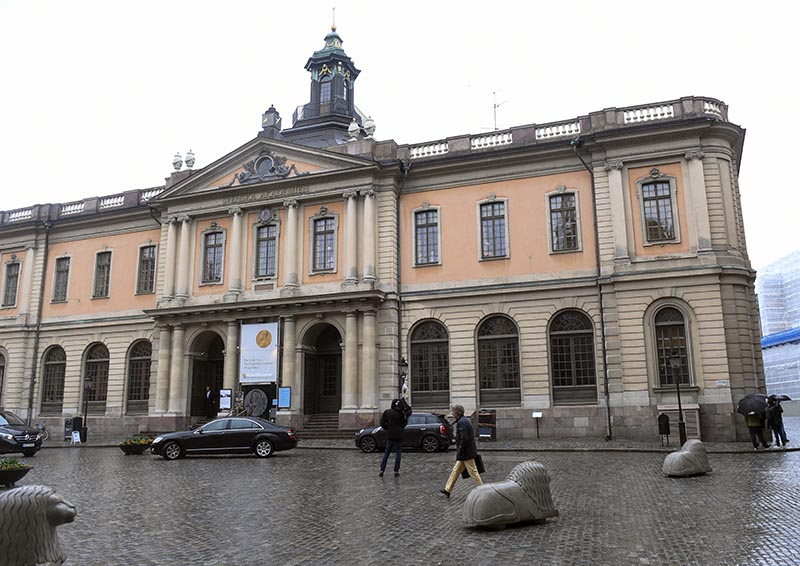Swedish Academy to reform after controversy postpones Nobel prize
STOCKHOLM: The Swedish Academy which decides the Nobel Prize for Literature said it would not make an award in 2018 and instead focus on internal reforms to restore its reputation in the wake of allegations of sexual harassment and information leaks.
The scandals have threatened to undermine the credibility of the award and attracted unprecedented scrutiny of the Academy, a highly secretive body whose choices of prize winner fascinate and often baffle literature lovers the world over.
Below are key elements of the controversy and its consequences.
What sparked the crisis?
At heart of the row are allegations of sexual assault and harassment made by several women against Jean-Claude Arnault, a photographer and well-known cultural figure in Sweden who is married to poet and Academy member Katarina Frostenson.
He is also accused of leaking prize-winners' names ahead of their official announcement, a major cultural event which is covered each year by the world's media.
Arnault denies all the allegations against him, including that of being the source of leaks, his lawyer said.
State prosecutors are conducting a preliminary investigation of assault allegations against Arnault. Another such investigation, regarding alleged assaults dating between March 2013 and April 2015, was dropped last month due to a lack of evidence and because for some the statute of limitations had passed.
The allegations made by 18 women against Arnault were first published in Swedish newspaper Dagens Nyheter in November. The same paper also reported that the Academy had carried out an internal investigation alleging that Arnault had leaked the closely-guarded names of Nobel Prize winners on seven different occasions.
The paper said these included Bob Dylan in 2016 as well as French author Jean-Marie Gustave Le Clezio in 2008 and British playwright Harold Pinter in 2005.
The Swedish Academy last month acknowledged that names had been leaked though it did not specify which laureates this concerned nor who the source of the leaks was.
Why did the controversy cause a rift in the academy?
After cutting ties with Arnault, the Academy held a vote on whether to exclude Frostenson from the body for allegedly breaching conflict of interest rules and divulging names of prize winners to her husband, who could then leak them.
The motion failed, with Frostenson allowed to stay, prompting three of the Academy's 18 members to resign in protest. In the following weeks another three, including the Permanent Secretary of the Academy, Sara Danius and Frostenson herself, also withdrew.
Eight Academy members said in an open letter to a newspaper that they had voted against excluding Frostenson on the grounds that the evidence, some of it from anonymous sources, was insufficient.
Frostenson has so far not commented publicly on the vote and accusations against her. She did not respond to a request for comment on Friday.
What reforms are underway?
Sweden's king has stepped in to drive reforms of the Swedish Academy, established in 1786 by his forebear Gustav III and of which he is the formal patron.
Appointments to the Academy have been for life and there has been no formal provision under the arcane rules for members to resign. That has meant those who withdrew could not be replaced.
This week, King Carl XVI Gustaf revised the Swedish Academy's rules to allow members resign. The change also means that members who have not participated in the Academy's work for two years will be considered to have resigned.
Other changes are likely in store. In connection with its decision to postpone the prize, the Swedish Academy said it had begun a wide-ranging project to alter the way it conducted its business while still seeking to respect its historic legacy.
Besides the right to resign, procedures for handling conflicts of interest and secret information would be strengthened while its external communication would also be modernised, it said in a statement.
"The active members of the Swedish Academy are of course fully aware that the present crisis of confidence places high demands on a long-term and robust work for change," it said.
What are the consequences?
The Academy took the rare decision to postpone the 2018 Nobel literature prize to next year, meaning it will award two prizes in 2019.
The prize has been postponed or cancelled only a handful of times, for instance during World War Two. The most recent postponement was the award to American novelist William Faulkner, who received his 1949 prize a year late, in 1950.
The biggest risk by far is to the reputation of the prize, which has come to be seen as one of the most important international honours in the field of literature.
The Nobel Foundation, which administers the estate of dynamite inventor Alfred Nobel, said the crisis at the Academy had "adversely affected" the Nobel Prize.
"Their decision underscores the seriousness of the situation and will help safeguard the long-term reputation of the Nobel Prize," the Foundation said in statement.
READ ALSO:






